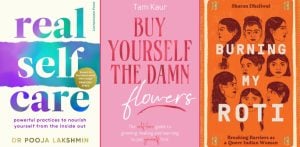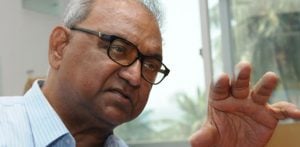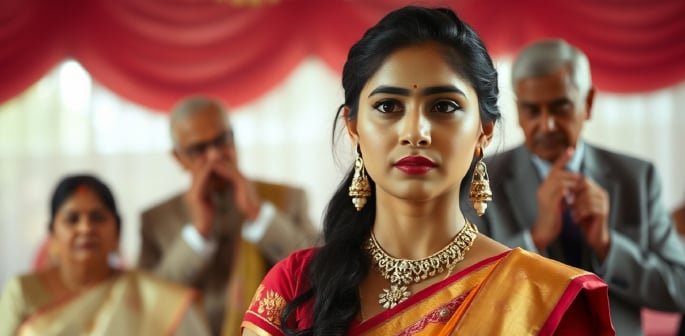Single individuals can feel they are falling behind.
In many South Asian households, marriage is not just a personal milestone but a social expectation.
The idea that a person’s worth is incomplete without a spouse remains deeply embedded in cultural conversations.
From family gatherings to casual meet-ups, questions about marriage often arrive uninvited and in rapid succession.
Young South Asians, especially women, are frequently placed under a microscope, with their relationship status treated as a measure of life progress.
For some, this pressure becomes a constant reminder that they are diverging from an “acceptable” path.
The reality is that single-shaming has a lasting impact, affecting self-esteem, life choices, and mental health.
The Pervasive Pressure to Couple Up
 South Asian culture has long placed marriage at the pinnacle of personal achievement, treating it as a rite of passage into full adulthood.
South Asian culture has long placed marriage at the pinnacle of personal achievement, treating it as a rite of passage into full adulthood.
Families often consider it a parental duty to ensure their children marry, preferably by a certain age.
Women, in particular, are told that a stable future hinges on securing a husband, overshadowing accomplishments in education or career.
Relatives may frame their comments as concern, but repeated queries about marriage prospects only reinforce urgency and unease.
Peer influence adds to this weight; when friends begin marrying, single individuals can feel they are falling behind.
This belief system perpetuates the idea that life without a partner is incomplete or less meaningful.
Gendered Expectations and Impact on Women
 The brunt of single-shaming falls on women, often beginning in their early twenties.
The brunt of single-shaming falls on women, often beginning in their early twenties.
Cultural narratives about a “biological clock” impose arbitrary deadlines for marriage, with women over a certain age deemed undesirable or “past their prime.”
Those who express disinterest in marriage may be labelled selfish, rebellious, or misguided by older relatives.
For divorced women, societal scrutiny intensifies, with pressure to remarry and avoid the “shame” of being alone.
The idea of a woman being happy and fulfilled without a husband remains alien to many.
This gendered bias not only undermines women’s autonomy but also reinforces outdated definitions of worth.
Impact of Shame and Social Consequences
 In South Asian communities, shame is a deeply ingrained tool for maintaining social order.
In South Asian communities, shame is a deeply ingrained tool for maintaining social order.
Singlehood is often framed not just as a personal shortcoming but as a blemish on the family’s reputation.
The fear of gossip and exclusion discourages individuals from embracing independent lifestyles, such as living alone or dating openly.
Over time, internalised shame can erode self-esteem, leading to feelings of inadequacy and failure.
These emotional burdens can manifest in anxiety, depression, and social withdrawal.
Rather than encouraging self-acceptance, the culture of single-shaming keeps many trapped in cycles of comparison and doubt.
Importance and Power of Choosing to Stay Single
 For an increasing number of South Asians, choosing singlehood is a conscious act of empowerment.
For an increasing number of South Asians, choosing singlehood is a conscious act of empowerment.
Social media has become a space where women share their journeys of self-discovery, healing, and rejecting timelines imposed by tradition.
This shift enables individuals to focus on personal growth, pursue their ambitions, and cultivate genuine relationships rather than obligatory ones.
Marriage is no longer viewed as the sole route to fulfilment but one of many valid life choices.
Public voices in the community are emphasising that being single is not a transitional phase but a complete and respected lifestyle.
By reframing singlehood, they challenge the idea that happiness is dependent on marital status.
Evolving Attitudes, But Barriers Remain
 Change is slowly taking root, particularly among second-generation South Asians raised in more open cultural contexts.
Change is slowly taking root, particularly among second-generation South Asians raised in more open cultural contexts.
Conversations about choice, autonomy, and identity are becoming more common, allowing space for diverse perspectives.
However, traditional mindsets remain influential, especially in closely-knit communities where family approval is paramount.
Many still encounter resistance when defying expectations, highlighting the need for ongoing dialogue and cultural education.
The work to dismantle single-shaming involves both challenging outdated norms and amplifying stories that celebrate independence.
Until acceptance becomes the norm, individuals will continue to face unnecessary judgment for living life on their terms.
Single-shaming is more than a series of awkward conversations.
It is a systemic cultural issue rooted in outdated ideas about success and self-worth.
By holding marriage as the ultimate goal, South Asian culture risks ignoring the value of diverse life paths.
Breaking this cycle requires families, communities, and individuals to question inherited beliefs and embrace new definitions of fulfilment.
It also means celebrating those who choose singlehood as intentionally as those who desire marriage.
As more voices speak out, the hope is that singlehood will be recognised not as a flaw but as a valid, dignified choice.
Only then can South Asians move towards a culture where happiness is self-defined, not socially dictated.






























































